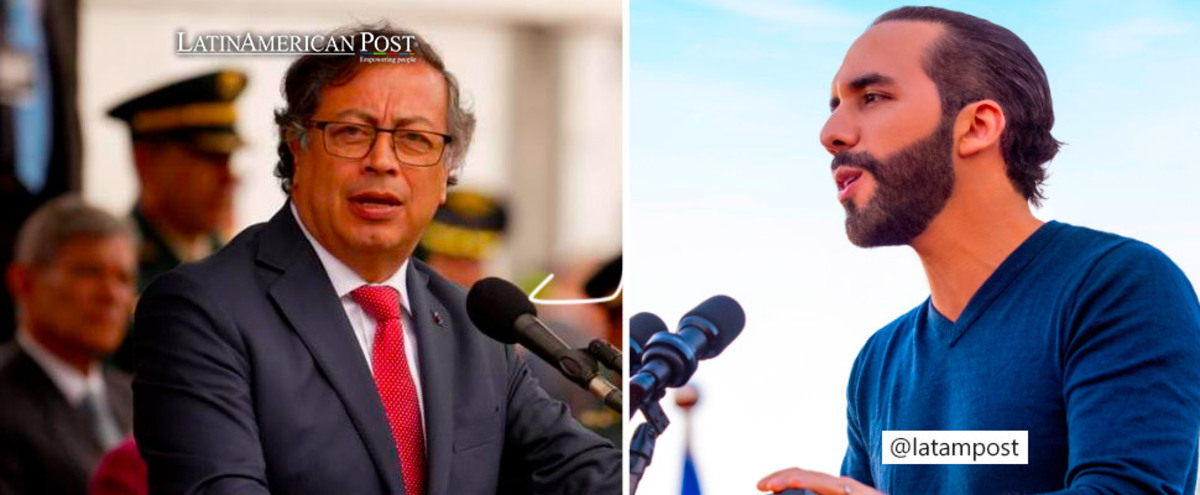Gustavo Petro and Nayib Bukele, an Ideological Fight
The presidents of El Salvador, Nayib Bukele, and of Colombia, Gustavo Petro, have found a political adversary in each other.

Photos: TW-PetroGustavo, TW-NayibBukele
LatinAmerican Post | Santiago Gómez Hernández
Listen to this article
Leer en español: Gustavo Petro y Nayib Bukele, una pelea ideológica
Two of the most influential presidents in Latin America today are Nayib Bukele of El Salvador and Gustavo Petro of Colombia. Both presidents represent different approaches and this has made them create a harsh relationship between the two countries. Twitter has already been the scene of debate and attacks between the two. Today, they not only celebrate their own triumphs, each defeat of one ends up reinforcing the ideas or positions of the other.
The Twitter Battle
For both Gustavo Petro and Bukele, Twitter is their favorite means of communication. Both have used this platform for several years to have contact with their citizens. The Salvadoran has constantly mentioned Colombia as an example, both negative and positive. He has highlighted the coalition achieved by former President Juan Manuel Santos, considering that his coalition included "from the extreme left to the conservatives… it seems incredible, but it is happening in Colombia."
However, beyond a couple of trills, everything changed on March 1, 2023, when Bukele published a video of Petro labeling the mega prisons that the Central American government has built and plans to build as a "concentration camp." The Colombian president explained that for many putting young people in prison is security and this triggers popularity, but for him the results must be obtained with education and spaces for dialogue.
The presidents of El Salvador, Nayib Bukele, and of Colombia, Gustavo Petro, have found a political adversary in each other. After this, Bukele found in Petro the staging of his opponents, both internal and external (to a greater extent). It is about what he has always called international NGOs that do not care about the lives of citizens, but about the rights of criminals. So, it is the Salvadoran who has taken advantage of any positive press in Colombia or scandals in the Petro family to reaffirm his position.
Also read: What Is the 'Soft Coup D'Étatt' Denounced by Gustavo Petro About?
It happened when Semana Magazine, one of the most important in Colombia and in opposition to Gustavo Petro, highlighted Bukele's work in El Salvador. Likewise, Petro also replied on his social network the news that New York prosecutors were investigating possible pacts between the Bukele government and gang leaders. The Salvadoran president took advantage and reminded Petro of the case, in which his son is dotted with possible acts of corruption.
The Background of the Enmity
Despite the fact that Bukele today is the image of the Latin American right and Petro is one of the most relevant leftist leaders on the continent, the dispute goes beyond politics. If it were only for ideology, the Salvadoran could find another socialist president to antagonize, since today there are several in the region.
What happens between Nayib Bukele and Gustavo Petro must be understood beyond a personal issue. Their personal relationship matters very little, if not what both leaders represent and defend. Two ways of seeing the problems and their solutions is what has led each one to defend their positions.
The biggest difference between the two leaders is their approach to solving the security issue. While Nayib Bukele has built his government program and his political success is due to his strong hand against crime. The construction of a mega prison with more than 40,000 inmates and the declaration of a state of emergency as a method to counteract the crime of the gangs in El Salvador have allowed Bukele to lower the rates of violence and crime.
For his part, Petro believes in a more complex solution, in which it is necessary to solve the causes, beyond the consequences. Petro understands that a great social pact is necessary, with substantial changes in the country's model, to prevent young people from falling into or resorting to crime. Additionally, today Petro seeks, through its great proposal for Total Peace, a generalized peace agreement with different violent and armed actors in the country. A unique way to achieve a context of peace in Colombia.
For Petro, the heavy-handed stance against crime is a double-edged sword. It has been the same Colombian left that has criticized for several years the actions of former president Álvaro Uribe, who also managed to reduce crime and violence in the conflict against the guerrillas, but with scandals of violation of human rights and extrajudicial executions by of the military.




